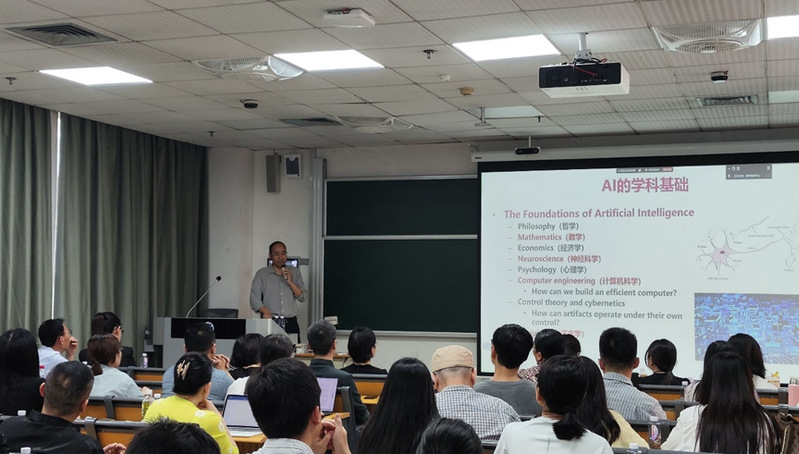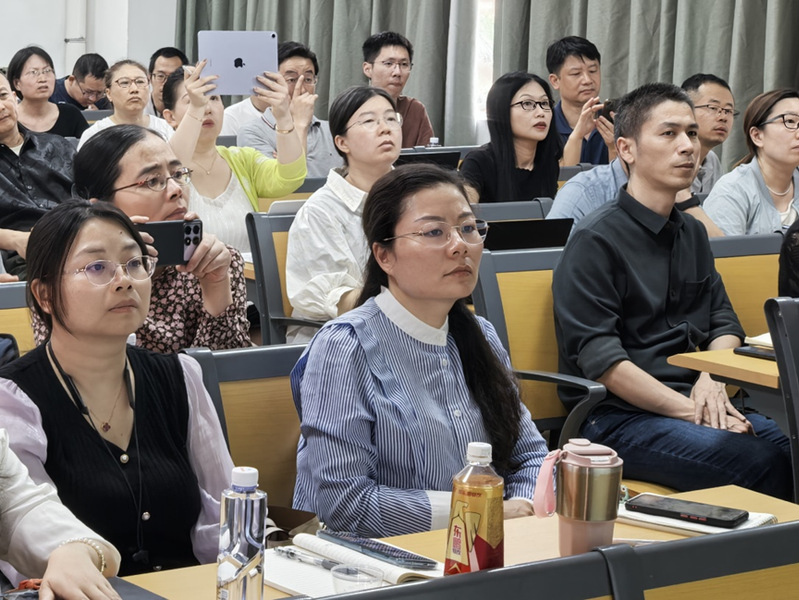- ABOUT JNU
- ADMISSION
-
ACADEMICS
- Schools and Colleges
-
Departments and Programs
- Arts College of
- Chinese Language and Culture College of
- Economics College of
- Electrical and Information Engineering College of
- Foreign Studies College of
- Information Science and Technology College of
- Environment School of
- Humanities School of
- International Business School
- International Studies School of
- Journalism and Communication College of
- Law School
- Liberal Arts College of
- Life Science and Technology College of
- Management School of
- Marxism School of
- Medicine School of
- Pharmacy College of
- Physical Education School of
- Science and Engineering College of
- Shenzhen Tourism College
- Research Institute
- Research Center
- Programs in English
- Majors
- Study Abroad
- Online Learning
- RESEARCH
- CAMPUS LIFE
- JOIN US
Jinan University Hosts 54th Session of Taste Teaching on Enhancing AI Literacy Among Teachers
Author: WANG Wenke
Publisher: Undergraduate Teacher Development Center
Date: March 31, 2025
On March 27th, Jinan University held the 54th session of “Taste Teaching,” featuring a lecture titled “Decoding the Ability Map of Artificial Intelligence from Technical Principles.” The event, hosted at the Shipai Campus, was led by Professor Lin Longxin from the College of Information Science and Technology. Professor Lin, a recipient of both the “Jinan Talent Program Teaching Master” award and the Guangdong Provincial Teaching Achievement Award, gathered nearly 120 educators from various disciplines to delve into the essential technical principles of artificial intelligence.

(At the lecture)
A Focus on Technical Principles
The lecture aimed to demystify artificial intelligence for teachers, articulating its underlying mechanisms and practical applications in education. Professor Lin emphasized the importance of understanding artificial intelligence not only as a tool but as a fundamental shift in instructional methodology. Using “technical principles” as a focal point, Lin commenced with an overview of the current state of AI technology, illustrating its widespread applications while transitioning into an analysis of its foundational principles.
In his presentation, Professor Lin outlined the key technological concepts of “digitalization” and “computer-based information processing” that are crucial to understanding the functionality of AI. He categorized artificial intelligence into two main types—discriminative AI and generative AI. This categorization was elucidated with examples of well-known language models, such as ChatGPT and DeepSeek, showcasing how they process and generate information across various media formats.

(At the lecture)
Implications for Education
Professor Lin underscored the urgency for educators to adapt to the advancements in AI technology, especially given their potential to transform traditional teaching paradigms. He emphasized the dual nature of these developments—while AI poses challenges, it also opens up significant opportunities for enhancing the educational landscape. Teachers were urged to confront the evolving role of AI proactively, acknowledging potential disruptions while exploring innovative pathways to integrate AI into their teaching.
During the lecture, Professor Lin highlighted the necessity of fostering a culture of inquiry among students, encouraging them to dig deeper into core knowledge and wisdom beyond surface-level understanding. He advocated for lifelong learning among educators, urging them to stay informed about emerging technologies and trends to remain relevant and effective in their pedagogical practices.
Engaging Dialogue
Following the presentation, a dynamic discussion ensued, allowing teachers to raise questions and share insights. This interactive session fostered a collaborative atmosphere, encouraging participants to consider practical applications of AI in their own teaching practices. The engagement was reflective of Jinan University's commitment to integrating cutting-edge technologies into education and optimizing classroom experiences.
Future Directions
In accordance with the objectives outlined in the “Jinan University AI Empowered Undergraduate Education Teaching Action Plan,” the Undergraduate Teacher Development Center plans to continue enhancing teachers' literacy in artificial intelligence. By promoting innovative teaching methodologies and facilitating diverse practices, the Center aims to develop a forward-looking talent cultivation model that prepares students for a rapidly changing academic and professional landscape.
Through initiatives like the “Taste Teaching” session, Jinan University demonstrates its dedication to equipping educators with the knowledge and skills necessary to harness the full potential of artificial intelligence in academia. This commitment not only enriches the educational environment but also ensures that both teachers and students are prepared to thrive in an increasingly technology-driven world.
NEWS
- About the University
- Quick Links
Copyright © 2016 Jinan University. All Rights Reserved.




